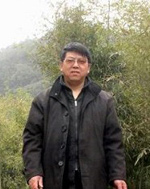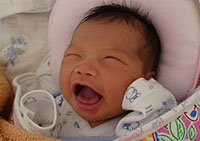




HONG KONG—Chinese authorities have freed a Hong Kong-based journalist jailed for almost three years on spying charges in time for the Lunar New Year celebrations, but also sentenced a pro-democracy activist to prison.
Ching Cheong, formerly chief China correspondent for Singapore’s Straits Times newspaper, was handed a five-year jail term by a Guangdong court in August 2006 for spying for Taiwan. He had been held previously for some 16 months and has recently been described as suffering from poor health.
A court in the southern Chinese city of Hangzhou meanwhile sentenced Lu Gengsong, a democracy activist, to four years’ imprisonment for “inciting subversion of state power.”
Authorities have also approved the arrest on subversion charges of the AIDS activist Hu Jia, now detained for more than a month, and again barred supporters from visiting his wife and infant daughter, who are welcoming the Lunar Year of the Rat under house arrest at their Beijing home.
The trial took about 15 minutes. As soon as Lu Gengsong was brought to the courtroom, the judge started to read the verdict. After 10 minutes when the reading finished Lu was taken away. No time was allowed for him to talk, but Lu Gengsong yelled 'Long Live Democracy' as he was taken away. As he was leaving, I yelled 'Lu Gengsong is innocent!
“I am grateful to the Chinese government for permitting my parole. I wish to thank people in Hong Kong for their understanding, trust, and support over the past two years,” Ching said in a statement Tuesday.
“I wish to thank Hong Kong Chief Executive Donald Tsang, The Straits Times in Singapore, and media friends in Hong Kong. Please spare me for a little bit while I reunite with my family, and I will speak to you all in a relaxed way later.”
Ching’s wife, May Lau, said Ching’s health had improved and he had been working in prison. “I am so busy and tired, but very excited. I am busy in preparing for the Lunar New Year,” she said. “As for my husband’s future plans, I believe first of all he has to rest for a while.”
Lu Jianhua, a scholar with the prestigious Chinese Academy of Social Sciences, was also arrested in Ching’s case in 2005 and sentenced to 20 years’ imprisonment in August 2006 for revealing state secrets.
Lu’s wife, contacted by telephone, said she hadn’t any news about her husband’s case.
“I’m happy at the news of Ching Cheong’s release, and I wish he could walk out from the shadows of the past earlier,” she said. “I cannot make further comments as I cannot speculate on when my husband might be set free. I have no news on that.”

In a statement, the press freedom group Reporters Without Borders (RSF) expressed relief at Ching’s release but added that "Ching should never have been arrested and imprisoned…”
“His release is very welcome, especially as it will allow him to celebrate the Chinese New Year with his family, but he is still not completely free. The Chinese government should continue down this road by releasing, before the start of the Olympic Games, all of the 32 journalists and 51 cyber-dissidents who are currently held,” RSF said.
In the southern city of Hangzhou, a court meanwhile sentenced Lu Gengsong, a Chinese democracy activist, to four years in prison on subversion charges.
Lu’s wife, Wang Xue’e, said the trial at the Hangzhou Intermediate People’s Court "took about 15 minutes. As soon as Lu Gengsong was brought to the courtroom, the judge started to read the verdict. After 10 minutes when the reading finished Lu was taken away."
"No time was allowed for him to talk, but Lu Gengsong yelled ‘Long Live Democracy’ as he was taken away. As he was leaving, I yelled ‘Lu Gengsong is innocent!’ Then police pulled me out of the courtroom," Wang said she planned to appeal.
Only four people were allowed in the courtroom, she said: herself, the couple’s daughter, and two other dissidents. Police stopped some two dozen other dissidents—at least one of whom had been warned to stay away—from entering the courtroom.

After the verdict, the dissidents waiting outside posed for a photo with a big-character poster that read, “Lu Gengsong is great for advancing democracy in China, where according to the Constitution we should have freedom of speech.” Police detained one member of the group for three hours, witnesses said.
In Beijing, police on Sunday barred more than 100 supporters from across China who tried to visit the home of detained AIDS activist Hu Jia, whose formal arrest has now been approved, to visit his wife and daughter.
“We went there bringing milk powder and fruit but were stopped by police and security guards right before the doorway,” Xiao Yishan, an oil worker rights representative, said.
“They said we cannot see Zeng Jinyan, his wife, and cannot give her anything. Police questioned me about where I am from, and we said we are from all around the country and Hu Jia is a good person and aided us before. Hu spoke for all of us, so why have you arrested him?”
Police followed the petitioners as they left for the bus stop, said another woman, surnamed Yang, a petitioner from Hubei. “I just want to see his wife because it is almost the Spring Festival, and our visit doesn’t have any other meaning,” she said.
Yang said several foreign reporters were also stopped by police at Hu’s home on Sunday. The foreign reporters took many pictures and collected many petition letters. Police checked their IDs and photo equipment, she said.
Hu’s mother on Sunday declined to discuss her son’s case in detail. “About Hu Jia’s case, it is hard to say,” she said.
A number of relatives of political prisoners behind bars are celebrating the Lunar New Year without their husbands and fathers this year; among them are Zhang Qing, wife of Guangdong-based civil rights lawyer Guo Feixiong, and Yuan Weijing, wife of jailed Shandong family planning activist Chen Guangcheng.
Original reporting by Yan Ming, Ding Xiao, and Fang Yuan for RFA’s Mandarin service. Service director: Jennifer Chou. Translated by Chen Ping. Produced in English by Sarah Jackson-Han and edited by Luisetta Mudie.